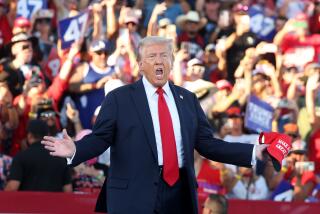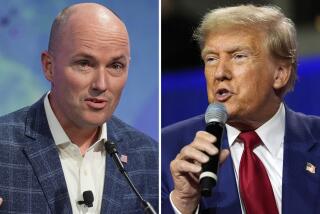Salt Lake Mayor Joins War Protest
NASHVILLE — With President Bush visiting Salt Lake City to address the American Legion today, the Utah city on Wednesday hosted one of the antiwar protests that presidential visits often attract. But this protest occurred in the capital of one of the reddest states in the nation, and one of the speakers was the mayor of its largest city.
In Salt Lake City, the ruckus surrounding Mayor Rocky Anderson, an iconoclastic Democrat, is seen by many as just “Rocky being Rocky,” said Randy Simmons, a political science professor at Utah State University who is married to one of Anderson’s cousins.
Still, the protest against Bush and his Iraq policy is a reminder that, even in friendly territory, the intensifying debate over the war is dominating his presidency.
The Utah Republican Party sponsored radio advertisements around the state denouncing the mayor and those advocating what the party calls “cut and run” tactics in Iraq.
The mayor’s office hired three temporary workers to answer the more than 1,600 calls it received over two days. Anderson’s spokesman said the Republican radio effort stirred up not just opposition, but also new demonstrations of support for the mayor’s anti-Bush positions.
Previewing his speech during a Republican fundraising appearance Wednesday evening in Nashville, the president said that leaving Iraq too early would “shred the credibility of the United States of America,” and that terrorists and insurgents fighting U.S. forces there would “follow us here.”
He said it would turn Iraq into a terrorist haven much as Afghanistan was under the Taliban -- but in this case the terrorists would have Iraq’s oil money to fund their activities.
Salt Lake City’s position as a Democratic island in a very Republican state notwithstanding, the protest underscored the sensitivity surrounding the war -- not just in more typically liberal communities, but in a state where the National Guard has contributed heavily to the force in Iraq, and one that gave Bush 71% of its vote two years ago.
That was the greatest percentage of any state in the 2004 election. Polls show that Bush remains more popular in Utah than in any other state.
The political effects of the war are apparent in multiple corners as the midterm elections approach. Several Republican candidates have accepted Bush’s readiness to help them raise money but have avoided being pictured in public with him.
In Connecticut, Republican Rep. Christopher Shays, once a supporter of the Iraq war, drew headlines last week for saying the United States should consider setting a timetable for withdrawing its troops -- a course Bush has opposed.
On Wednesday, Anderson addressed protesters hours before Bush was due to arrive in town. The crowd numbered 5,000 or more, said Crystal Young-Otterstrom of protest sponsor Utahvoices.org. The Salt Lake Tribune reported that about 4,000 attended.
Anderson drew attention a year ago for participating in an anti-Bush rally, but this year’s protest prompted more debate, in part because of the Republican radio campaign.
The advertisements ran Monday and Tuesday on stations throughout the state, said the state party’s executive director, Jeff Hartley. On some stations, they were broadcast 20 times a day.
“The goal is really just to raise our voice and let the rest of the nation know that Rocky and the rest of his folks do not represent the values of the rest of Utah,” Hartley said.
At the same time, he said, with an election approaching, the advertising would stir up fellow Republicans.
“It’s easy to be apathetic when you have a 70% majority,” he said.
Anderson said in a telephone interview Wednesday that Republicans “would rather shut down any dissent” than discuss “the facts, which would mean admitting to the outrageous misrepresentation ... leading us into the war.”
“These people have clearly not understood the message of Theodore Roosevelt, who said it was not only unpatriotic and servile to insist on standing behind the president right or wrong, but that it was morally treasonable,” Anderson said.
Bush’s American Legion address will be the first in a new series of speeches on the battle against terrorism, culminating with his scheduled appearance before the U.N. General Assembly on Sept. 19, the White House said Wednesday.
Bush said there was nothing political about the upcoming speeches.
“They’re not political speeches,” he said outside a restaurant in Little Rock, Ark., near a fundraising reception he attended on behalf of GOP gubernatorial candidate Asa Hutchinson. “They’re speeches to make it clear that, if we retreat before the job is done, this nation will become even more in jeopardy.
“These are important times, and I seriously hope people wouldn’t politicize these issues that I’m going to talk about. We have a duty in this country to defeat terrorists,” the president said.
His comments came a day after Defense Secretary Donald H. Rumsfeld drew attention, and angered Democratic officials, for comparing critics of the Bush administration to people who sought to appease the Nazis before World War II.
Bush had traveled to Nashville on Wednesday to raise money for Bob Corker, the Republican nominee for the Senate.
In Salt Lake City today, Anderson’s opposition to Bush will probably deprive the president of one of his favorite laugh lines.
Usually, at the start of a speech, the president recognizes the dignitaries present. A governor, a senator -- each typically gets an appreciative mention. Then, Bush recognizes the local mayor, for whom he offers three words of advice: “Fill the potholes.”
More to Read
Sign up for Essential California
The most important California stories and recommendations in your inbox every morning.
You may occasionally receive promotional content from the Los Angeles Times.










